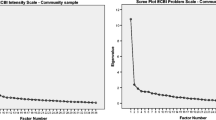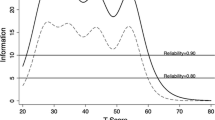Abstract
Kazdin's (1980a) Treatment Evaluation Inventory (TEI) is the major instrument used to assess parents' acceptance of procedures for behavior problem children. The length of the TEI, however, as well as problems with its scaling and wording limits its value as a clinical research instrument. In the present study, three experiments were conducted to develop a modified TEI. In Experiment 1, 153 parents completed the TEI to evaluate a behavioral treatment for noncompliant and oppositional children. A factor analysis of the data was used to obtain a reliable factor structure for the TEI and to construct a 9-item TEI-Short Form (TEI-SF) with a 5-point scale, consistent anchors on the scale, and simplified text and instructions. Experiment 2 evaluated the psychometric characteristics of the TEI and the TEI-SF. These data indicated the TEI-SF is a sound alternative to the original TEI. Experiment 3 compared the readability and completion time of the two instruments.
Similar content being viewed by others
References
Cavell, T. A., Frentz, C. E., & Kelley, M. L. (1986a). Acceptability of paradoxical interventions: Some nonparadoxical findings.Professional Psychology, 17, 519–523.
Cavell, T. A., Frentz, C. E., & Kelley, M. L. (1986b). Consumer acceptability of the single case withdrawal design: Penalty for early withdrawal?Behavior Therapy, 17, 82–87.
Cross-Calvert, S., & McMahon, R. J. (1987). The acceptability of a behavioral parent training program and its components.Behavior Therapy, 18, 165–180.
Dorsett, P. G., Matlock, A., & Hobbs, S. A. (1986).Acceptability of behavior management techniques as a function of rationale. Paper presented at the meeting of the Association for Advancement of Behavior Therapy, Chicago, Ill., Nov.
Frentz, C. E., & Kelley, M. L. (1986). Parents' acceptance of reductive treatment methods: The influence of problem severity and perception of child behavior.Behavior Therapy, 17, 75–81.
Harman, H. H. (1976).Modern factor analysis. Chicago: University of Chicago Press.
Harris, A. J., & Sipay, E. R. (1975).How to increase reading ability (6th ed.). New York: McKay.
Heffer, R. W., & Kelley, M. L. (1987). Mothers' acceptance of behavioral interventions for children: The influence of parent race and income.Behavior Therapy, 18, 153–164.
Kazdin, A. E. (1980a). Acceptability of alternative treatments for deviant child behavior.Journal of Applied Behavior Analysis, 13, 259–273.
Kazdin, A. E. (1980b). Acceptability of time-out from reinforcement procedures for disruptive child behavior.Behavior Therapy, 11, 329–344.
Kazdin, A. E. (1981). Acceptability of child treatment techniques: The influence of treatment efficacy and adverse side effects.Behavior Therapy, 12, 493–506.
Kazdin, A. E. (1984). Acceptability of aversive procedures and medication as treatment alternatives for deviant child behavior.Journal of Abnormal Child Psychology, 12, 289–302.
Kazdin, A. E., French, N. H., & Sherick, R. B. (1981). Acceptability of alternative treatments for children: Evaluations by inpatient children, parents, and staff.Journal of Consulting and Clinical Psychology, 49, 900–907.
Norton, G. R., Austen, S., Allen, G. E., & Hilton, J. (1983). Acceptability of time out from reinforcement procedures for disruptive child behavior: A further analysis.Child and Family Behavior Therapy, 5(2), 31–41.
Pickering, D., & Morgan, S. B. (1985). Parental ratings of treatments of self-injurious behavior.Journal of Autism and Developmental Disabilities, 15, 303–314.
Prout, H. T., & Chizik, R. (1988). Readability of child and adolescent self-report measures.Journal of Consulting and Clinical Psychology, 56, 152–154.
Singh, N. N., & Katz, R. C. (1985). On the modification of acceptability ratings for alternative child treatments.Behavior Modification, 9, 375–386.
Witt, J. C., & Elliott, S. N. (1985). Acceptability of classroom management strategies. In T. R. Kratochwill (Ed.),Advances in school psychology (Vol. 4, pp. 251–288). Hillsdale, NJ: Lawrence Erlbaum Associates.
Witt, J. C., & Martens, B. K. (1983). Assessing the acceptability of behavioral interventions used in classrooms.Psychology in the Schools, 20, 510–517.
Witt, J. C., Martens, B. K., & Elliott, S. N. (1984). Factors affecting teachers' judgments of the acceptability of behavioral interventions: Time involvement, behavior problem severity, and type of intervention.Behavior Therapy, 15, 204–209.
Author information
Authors and Affiliations
Rights and permissions
About this article
Cite this article
Kelley, M.L., Heffer, R.W., Gresham, F.M. et al. Development of a modified treatment evaluation inventory. J Psychopathol Behav Assess 11, 235–247 (1989). https://doi.org/10.1007/BF00960495
Accepted:
Issue Date:
DOI: https://doi.org/10.1007/BF00960495




